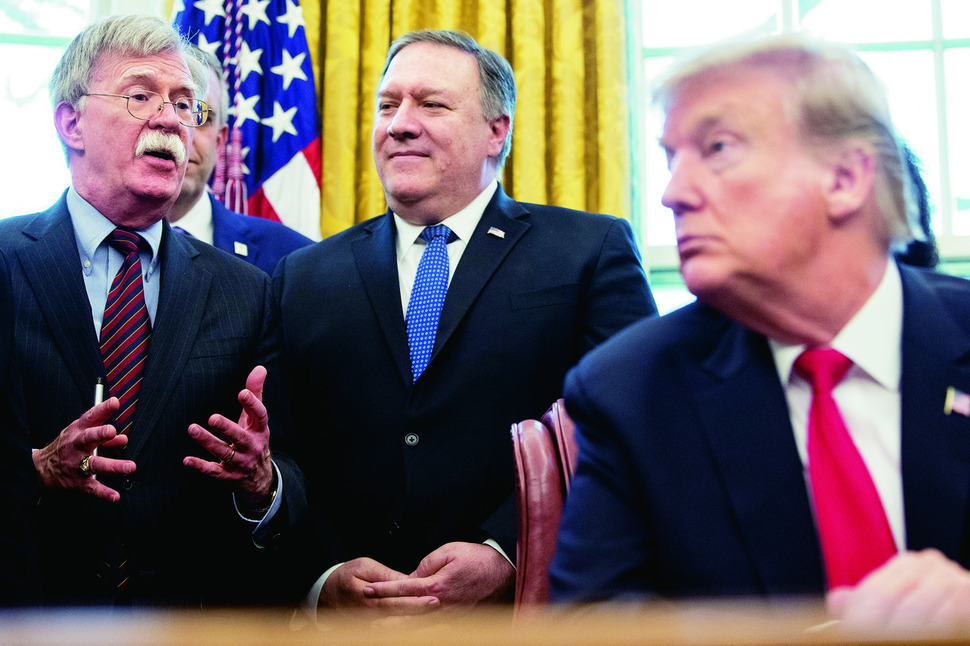 |
|
White House National Security Advisor John Bolton, US Secretary of State Mike Pompeo and US President Donald Trump – the key US figures on North Korea policy. (AP/Yonhap News)
|
US seems to want a declaration of surrender more than dialogue
The UN Security Council’s sanctions on North Korea began with Resolution No. 1718, which was adopted on Oct. 9, 2006, shortly after the North carried out its first nuclear test. The council has passed a total of 10 sanctions resolutions against the North, the last being No. 2397, which was adopted after the North test launched its Hwasong-15 intercontinental ballistic missile on Nov. 29, 2017. There’s a sentence that appears without fail in all of these resolutions. Now that North Korea-US negotiations have run aground after the Hanoi summit ended without a deal, this sentence has acquired fresh significance: “[the UN Security Council] affirms that it shall keep DPRK’s actions under continuous review and that it shall be prepared to review the appropriateness of the measures contained [. . .] above, including the strengthening, modification, suspension or lifting of the measures, as may be needed at that time in light of the DPRK’s compliance with the provisions of the resolution.” North Korean lawyers have embarked on an unexpected tour of China. China’s state-run newspaper the Global Times reported on Apr. 2 that the lawyers were invited to China by the Beijing-based Deheng Law Group. According to the Global Times, the lawyers will be holding investment seminars on a tour of Beijing, Ji’nan, Qingdao, Shanghai and Shenzhen lasting from Apr. 1 to 13. Deheng said that these seminars have been organized to increase understanding of North Korea’s foreign trade and investment policy in advance of sanctions relief on the North. The North Korean lawyers who are participating in the seminars are reportedly among the 20 or so lawyers working for the Korea External Economic Law Consulting Office (KEELCO), which is affiliated with North Korea’s Ministry of External Economic Relations. Even while the North Korea-US negotiations are faltering, North Korea is basically gearing up for the post-sanctions period. “Developing external economic cooperation and exchange will contribute to developing the nation’s economy and to increasing the people’s standard of living.” That’s the first article of North Korea’s Economic Development Zone Act. “Developing external economic cooperation and exchange” is impossible so long as North Korea is under international sanctions. The same applies for improving the people’s standard of living. North Korea is well aware of that, which is why it declared the “completion” of its two-track nuclear and economic line and decided to focus on economic development in the third plenum of its 7th Central Committee, which was held on Apr. 20, 2018, one week before the first summit between North Korean leader Kim Jong-un and South Korean President Moon Jae-in. This was an open declaration to the international community that the North is ready to set aside its nuclear program, which has been hobbling its economy. North Korea’s legal and institutional commitment to reform and opening When we narrow our focus to the legal and institutional aspects, North Korea’s commitment to reform and opening becomes even clearer. Around the death of former North Korean leader Kim Jong-il, the North had already instituted a large number of laws related to the external economy. Five laws, including the Foreign Investment Act and the Foreign Corporation Act, were tweaked on Nov. 29, 2011, just 20 days before Kim’s death, along with the Rason Special Economic Zone Act and one other law on Dec. 3. Adjustments were made to seven laws, including the Foreign Investment Bank Act, on Dec. 21, just four days after Kim’s death. Considering that Kim’s funeral wasn’t held until Dec. 28, these adjustments can be regarded as having already been in the pipeline.
 |
|
Jung In-hwan, Beijing correspondent
|







